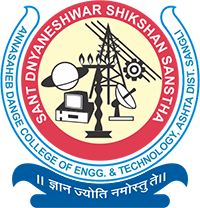Vision :
To be a leader in developing Electrical Engineering graduates with knowledge, skills & ethics.
Mission:
We, at the Department of Electrical Engineering, are committed to achieve our vision by:
- M-1 Facilitating learning through outcome based education.
- M-2 Cultivating skills & attitude among graduates to excel in their career.
- M-3 Motivating research approach of graduates to solve real-time problems for benefit of the society.
- M-4 Strengthening relationship with all stakeholders for continuous improvement
Programme Educational Objectives (PEOs)
The graduate of electrical engineering program will:
PEO-1 : Domain Knowledge: Solve problems related to Electrical Engineering by applying its principles, tools and practices.
PEO-2 : Domain Knowledge: Solve problems related to Electrical Engineering by applying its principles, tools and practices.
PEO-3 : Lifelong learning: Engage in lifelong learning for effective adaptation to technological challenges.
PEO-4 : Professionalism: Demonstrate leadership skills at workplace and function professionally in competitive environment.
Program Outcomes (POs as defined by NBA)
The graduates of electrical engineering program will be able to demonstrate:
PO-1 : Engineering knowledge: Apply the knowledge of mathematics, science, engineering fundamentals, and an engineering specialization to the solution of complex engineering problems
PO-2 : Problem analysis: Identify, formulate, review research literature, and analyze complex engineering problems reaching substantiated conclusions using first principles of mathematics, natural sciences, and engineering sciences.
PO-3 : Design/development of solutions: Design solutions for complex engineering problems and design system components or processes that meet the specified needs with appropriate consideration for the public health and safety, and the cultural, societal, and environmental considerations
PO-4 : Conduct investigations of complex problems: Use research-based knowledge and research methods including design of experiments, analysis and interpretation of data, and synthesis of the information to provide valid conclusions.
PO-5 : Modern tool usage: Create, select, and apply appropriate techniques, resources, and modern engineering and IT tools including prediction and modeling to complex engineering activities with an understanding of the limitations.
PO-6 : The engineer and society: Demonstrate understanding of contemporary knowledge of engineering to assess societal, health, safety, legal and cultural issues and the consequent responsibilities relevant to the professional engineering practice
PO-7 : Environment and sustainability: Understand the impact of the professional engineering solutions in societal and environmental contexts, and demonstrate the knowledge of, and need for sustainable development.
PO-8 : Ethics: Apply ethical principles and commit to professional ethics and responsibilities and norms of the engineering practice.
PO-9 : Individual and team work: Function effectively as an individual, and as a member or leader in diverse teams, and in multidisciplinary settings.
PO-10 : Communication: Communicate effectively on complex engineering activities with the engineering community and write effective reports and design documentation, make effective presentations, and give and receive clear instructions.
PO-11 : Project management and finance: Demonstrate knowledge and understanding of the engineering and management principles and apply these to one’s own work, as a member and leader in a team, to manage projects and in multidisciplinary environments
PO-12 : Life-long learning: Recognize the need for, and have the preparation and ability to engage in independent and life-long learning in the broadest context of technological change.
Program Specific Outcome (PSO)
PSO 1 : Ability to apply electrical engineering knowledge, skills for testing, control & maintenance of electrical systems such as Machines, Power Systems, Drives & Automation.
PSO 2 : Ability to identify problems in the diversified areas of Electrical Engineering and determine the hardware or software solutions to support the Societal, Environmental & Industrial needs.

